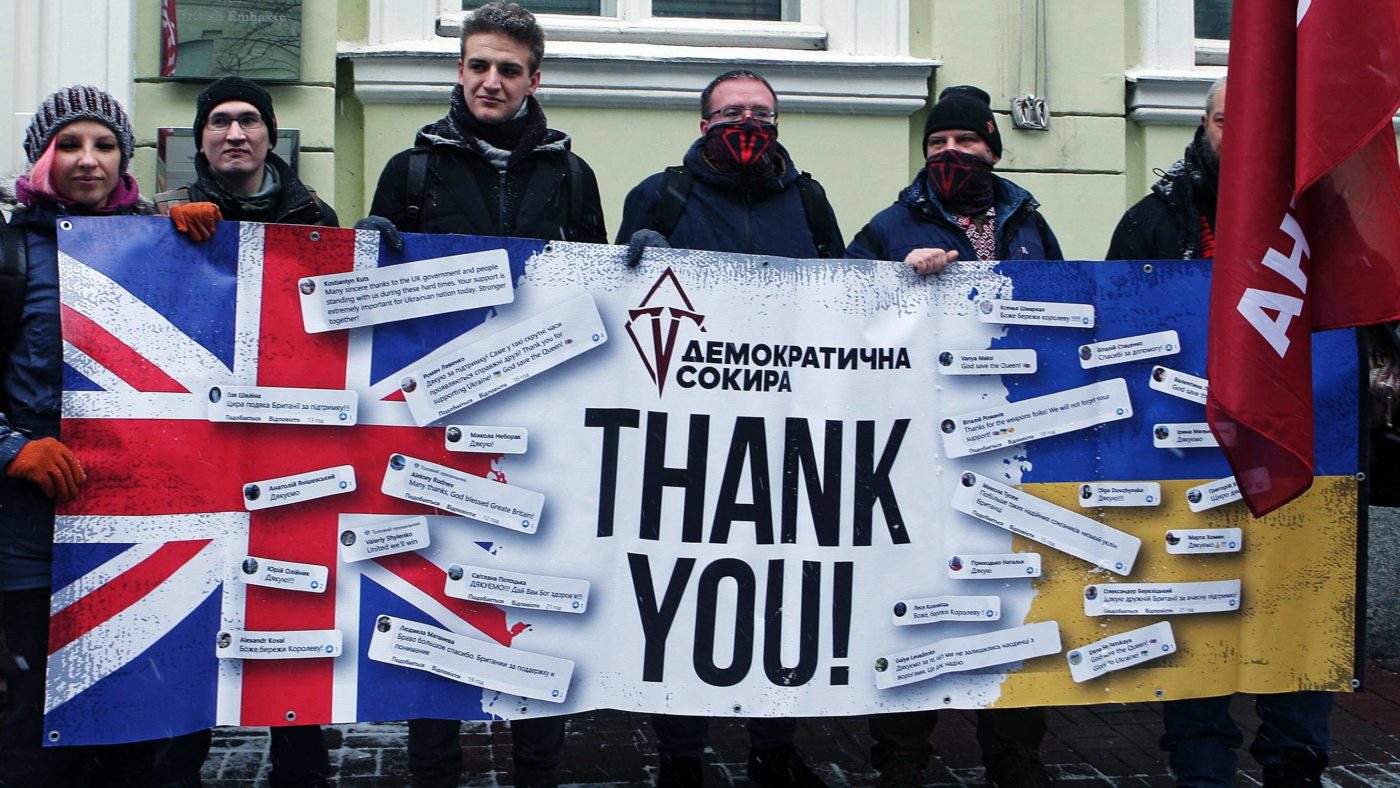Reading reports of ‘tensions’ on the Ukrainian border feels faintly surreal. For one thing it implies a two-way process, when the reality is that one country has massed its troops on another’s border in preparation for an attack. Both British and American embassies have told staff to leave Kyiv, which suggests their fears of invasion are very real indeed.
Distressing as it to see Western powers pulling their people out of my homeland, it’s worth stressing that the British government has proven one of our most consistent allies throughout nearly eight years of war with Russia. Indeed, at a time of endless domestic political drama, Ukraine is one of the few issues that has united the Conservatives and Labour in a common purpose.
That the UK should take the lead is perhaps unsurprising, given the violence Russia has wrought on British soil. And, as Defence Secretary Ben Wallace wrote in a compelling essay last week, a Russian invasion is not just a threat to Ukraine, but to ‘all of us in Europe’.
And the UK has offered more than just words. As part of Operation Orbital, Britain has sent short-range anti-tank missiles for Ukraine to defend itself in the event of attack. That very concrete show of solidarity has gone down well with the public too, with ‘God Save the Queen’ a trending topic on Ukrainian social media over the last week.
Of course, Britain is not the only one in our corner. The Baltics, traditionally supportive of Ukraine and its aspiration for a European future, have shared their defence equipment with their near neighbour. Denmark and Spain are sending planes and ships to eastern Europe, France has put its troops on stand-by. And though the US may have stopped short of committing boots on the ground, the White House has promised to bolster the 5,000 Nato troops in the region to 50,000.
There is one obvious exception to the relatively united Western position – Germany. Despite a new government, Berlin’s shameful ambivalence in the face of Russian aggression has not changed. During her recent visit to Kyiv and Moscow, German foreign minister Annalena Baerbock made some vague statements about the value of the post-war territorial inviolability in Europe, while blocking the delivery of defensive weapons to Ukraine.
The German position was perfectly summarised by the country’s Head of Navy Kay-Achim Shonbach. The vice-admiral bluntly declared that the Crimean territory annexed in 2014 ‘is never to be regained’ and that President Putin ‘wants nothing but respect, which he also probably deserves’. Shonbach may have been forced to resign over those comments, but his comments were arguably no worse than the half-hearted vacillation that his government has consistently shown.
Underpinning the German attitude is one simple word: gas. Europe as a whole relies on Russia for 40% of its natural gas, while for Germany that number goes up to 60%. Berlin’s support for the NordStream 2 pipeline, which brings Russian gas directly to Germany, bypassing Ukraine, could be seen as a simple act of pragmatism.
One idea that is extremely hard for Ukrainians to credit, however, is that the German attitude stems from guilt towards Russia because of the Second World War. If that were the case, why would they not share the same sense of guilt towards Ukraine, which lost 8 million people to the Nazis, and on whose territories the Wehrmacht perpetrated some of the greatest atrocities in human history? And that’s to say nothing of recent history, or the 14,000 people who have died in a war instigated by the Kremlin – a reality that reports of ‘pro-Russian separatists’ in eastern Ukraine willfully obscure.
Nor should we forget the useful idiots in the West. only too content to parrot the Kremlin’s favourite talking points. We’ve come to expect such nonsense from the likes of Stop the War, but it’s frankly gobsmacking to read columnists in supposedly serious British newspapers regurgitating the Kremlin’s mendacious propaganda to argue that Britain should ‘stay well out of the situation’.
The resolve of Ukrainians themselves, however, is not in doubt. As a veteran of the Euromaidan protests and a former member of the Ukrainian parliament, I know only too well my compatriots’ willingness to make sacrifices in the name of freedom. During the Revolution of Dignity eight years ago, I saw middle-class Ukrainians, doctors and writers, take to the streets armed with wooden shields and cobble stones against special forces wielding Kalashnikovs.
The spirit of that battle, which saw Russia’s puppet president Viktor Yanukovych overthrown, has not been extinguished – and Putin should be under no illusions that Ukrainians will defend their country to the bitter end.
Click here to subscribe to our daily briefing – the best pieces from CapX and across the web.
CapX depends on the generosity of its readers. If you value what we do, please consider making a donation.


